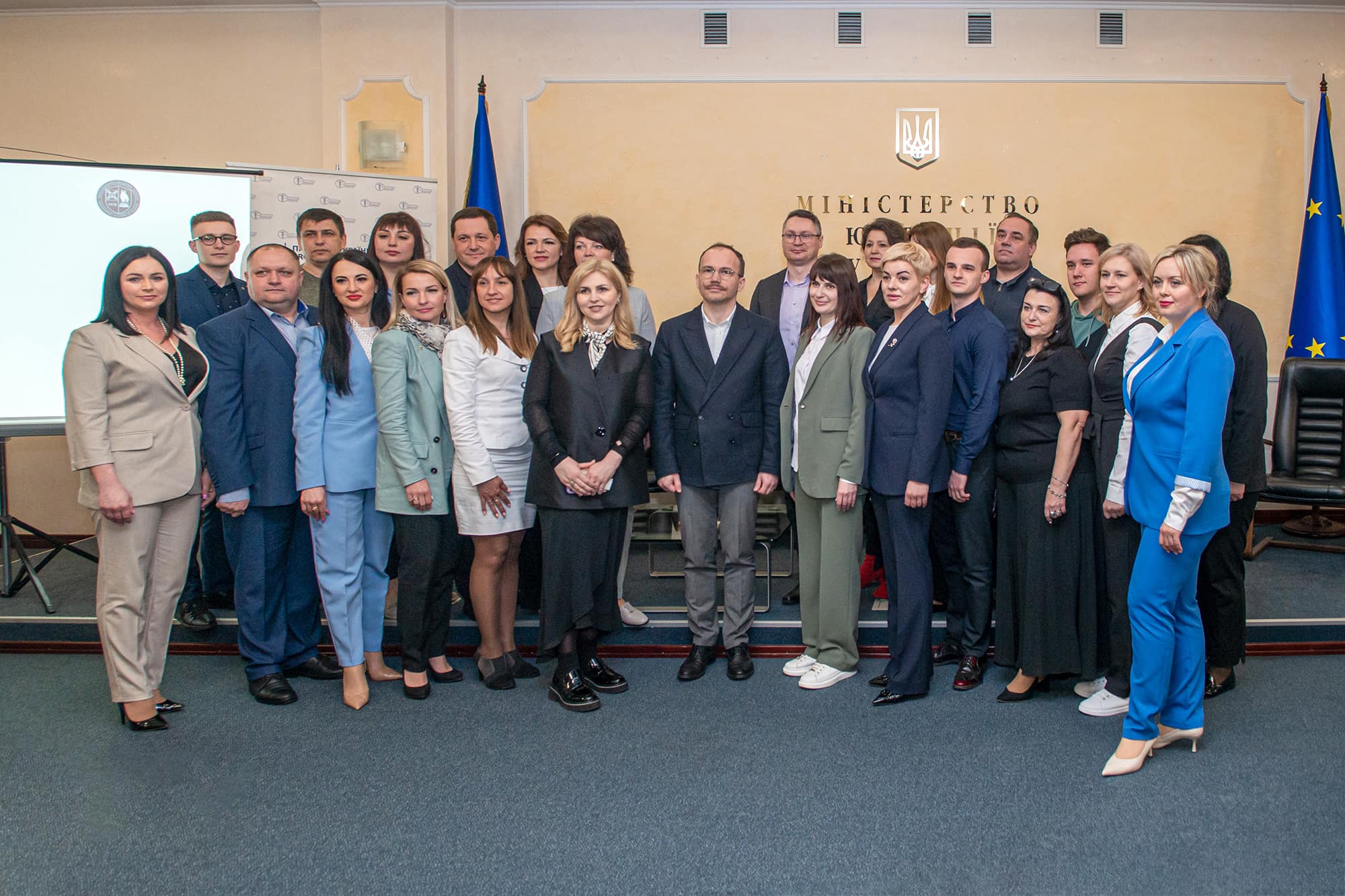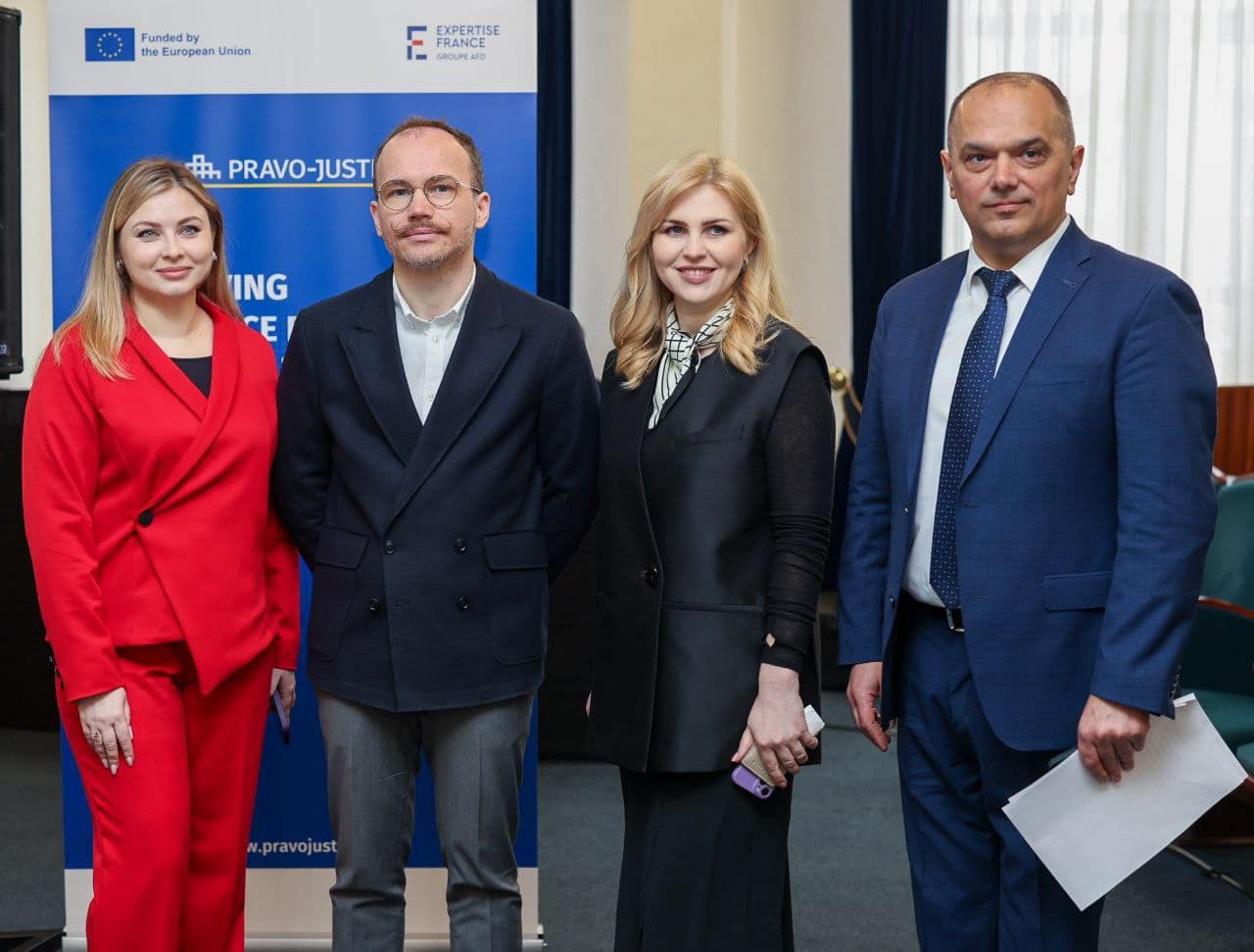International Scientific and Practical Conference on Probation Reform in Ukraine was held with the support of EU Project Pravo-Justice

On 26 April, an international scientific and practical conference “Probation Reform: An Opportunity to Choose the Future” was organised by the Ministry of Justice of Ukraine together with the State Institution “Probation Centre” and the Penitentiary Academy of Ukraine with the support of EU Project “Pravo-Justice”. Representatives of the Ministry of Justice, the Office of the Prosecutor General, MPs, judges, probation officers from Ukraine and foreign countries, academics, volunteers, and national experts of EU Project Pravo-Justice participated in the event.
Iryna Zharonkina, Enforcement and Protection of Property Rights Component Lead of EU Project Pravo-Justice noted that the Project has been supporting the Ministry of Justice of Ukraine for many years in reforming the penitentiary system and developing probation in Ukraine based on international experience and European standards.
Irina Zharonkina elaborated, “Further areas of work include improving and unifying assessment of the risk of reoffending, working with probation officers and strengthening the professional training system, creating a competency framework, working with prison psychologists, and engaging volunteers. One of the most important areas is to support the Ministry in developing electronic tools – improving the work of the Convict Register, creating automated tools that probation staff can use to improve their performance”.

In her address, Olena Vysotska, Deputy Minister of Justice, discussed the challenges the probation system faces, its key successes, and plans to promote this type of punishment.
“The government’s Strategy for Reforming the Penitentiary System outlines probation development as a particular area. The authorities are to explain to every Ukrainian that probation is a fair punishment and should be applied as much as possible,” said Olena Vysotska. She said that on 28 March 2024, Law of Ukraine No. 3342-IX “On Amending the Criminal Code, the Criminal Procedure Code and Other Legislative Acts of Ukraine on Improving the Types of Criminal Punishment” came into force, introducing a new type of criminal punishment – probation supervision.
“Our goal is to expand the number of articles of the Criminal Code that provide for probation supervision as a type of criminal punishment. Another strategic goal is to improve the punishment in the form of community service and fines,” the Deputy Minister added. Moreover, according to Olena Vysotska, other priorities include unifying risk assessment and developing new probation programmes, conducting ongoing work with staff, creating model offices, introducing E-Probation mobile application, introducing the Unified Register of Convicts and Detainees (URCD), improving techniques for working with convicts for crimes against the foundations of national security which would reflect the experience of organisations and institutions that study wartime collaboration in Ukraine, and using electronic monitoring devices (bracelets).
Speaking about digitalisation in the field of probation, Serhii Orlov, Deputy Minister of Justice, noted that it is necessary to improve the URCD. According to him, the main task is filling in the archive, improving data quality, optimising it, and introducing new features. He also announced an update to the system for assessing the risk of reoffending called Casandra.
“Last year, we ran a pilot project using an AI system. We want to build a model that will learn by itself. That is, when reoffending occurs, the system will receive additional data to use all the factors and draw conclusions about which of these factors affect the reoffending,” said Serhii Orlov. He also clarified that the updated pilot project will be re-launched by the end of the year.
He also said that the Ministry of Justice, with the support of EU Project Pravo-Justice, plans to transfer the mobile application “My Probation” and the Unified Distance Education Platform of the State Criminal Enforcement Service of Ukraine for beta testing by the end of the year.
Viktoriia Litvinova, Deputy Prosecutor General of Ukraine, said that since 2015, when the Law on Probation came into force, the number of people sentenced to imprisonment/restriction of liberty for a certain period of time has decreased by almost 60%, and arrests have declined from 25,000 to 15,000 (in 2023).
“These figures demonstrate that the criminal justice system, including the public prosecutor’s office and the courts, have recognised the efficiency of switching from criminal and administrative measures to using modern probation programmes that combine individual preventive work and a differentiated approach to providing counselling, therapy and other types of support,” said Viktoriia Litvinova. The representative of the Office of the Prosecutor General of Ukraine also noted that the new measure, probation supervision, is an effective alternative to arrest. Over the past month, courts have allowed 400 convicts held in detention centres to use probation supervision instead of arrest.
She also added that the public prosecutor’s office is ready to assist in expanding the list of tools and techniques to carry out new types of punishment and modern probation interventions based on international best practices.
Viktor Ostapko, a justice of the Cassation Criminal Court of the Supreme Court, and Vladyslav Kukhta, a judge-speaker of the Chernihiv District Court, emphasised the importance of developing probation, and probation supervision in particular.
“Prison has not reformed many people. Probation is one of the types of punishment that can give a person a chance. It should definitely be used if a person has committed an offence for the first time,” said Viktor Ostapko.
Oleh Yanchuk, Director of the State Institution “Probation Centre”, focused on the importance of training professional staff and continuous professional development of probation officers. Serhii Synohub, National Expert of EU Project Pravo-Justice, presented the HR strategy developed with the Project’s assistance, which provides for the step-by-step implementation of new approaches to managing the staff of the State Institution “Probation Centre”. This very strategy made the Probation Centre a finalist of the All-Ukrainian HR Pro Awards – 2023.

Olena Kochura, National Expert of EU Project Pravo-Justice, delivered a presentation on risk assessment as a unified probation tool. She said that with the assistance of the Project, a draft unified risk assessment system has been prepared, which is to be piloted starting from 29 April. According to Ms. Kochura, it includes a single risk assessment form, detailed explanations including recommendations and examples, correlation of the results of risk assessment within pre-trial and supervised probation, risk mitigation recommendations, and better predictability of recidivism.
Video recording of the international scientific and practical conference is available here.